- Home
- Bianca Blythe
Don't Tie the Knot Page 2
Don't Tie the Knot Read online
Page 2
“Naturally. You must desire to prepare for your brother’s arrival. The wedding’s in two days. He’s bound to arrive today.”
“Er—yes.” The duke headed for the door and then stopped abruptly, remembering to bow.
Georgiana’s family descended once again into bows and curtsies, and Georgiana was relieved when he’d left.
Charlotte frowned. “I really wish you hadn’t written him, Mama.”
“Nonsense. You don’t mean that,” their mother replied, though an uncertain note had entered her voice.
Chapter Three
The sun might be setting, casting pink and orange light over the excessively ornate buildings, but thankfully the coachman did not succumb to any sentimental urgings and slow his speed. The hired post chaise moved briskly through Smithfield Market and entered Mayfair. Finally, it halted, and Hamish leaped onto the pavement, not waiting for the coachman to assist him.
His brother’s townhouse loomed before him, wedged into a row of neatly maintained homes on Grosvenor Square. The man didn’t even have a garden, and the stretch of lawn on the square seemed an imperfect substitute. Why did Callum insist on living here, when he might have an entire castle at his disposal perched on a craggy mountaintop that trounced any Palladian design in magnificence?
The estate will be lost without a marriage to Lady Isla.
His chest panged. Their parents had gone to their graves assuming that their eldest son would marry the neighbors’ daughter, as had Lord and Lady McIntyre themselves. Dear Isla was expecting to be made a duchess. Her brother was expecting her to become a duchess, and one didn’t go about irritating Wolfe, especially when their properties touched.
His brother should be grateful his life had been so neatly arranged and not strive to make it complicated by making promises to lassies, no matter how fetching they might look.
Hamish strode toward the portico. He knew what would happen next: the butler would announce him, and his brother would express surprise that he’d made the long journey.
Perhaps Callum and he would call on the family the next morning, and he could attempt to make forced conversation over whatever ridiculous drinks the English served. Likely they would give him some tea. The English ton seemed delighted in pouring hot water over dried herbs from the Orient and declaring it a delicacy. Hamish huffed. Nothing could compare to a good Scottish whisky.
Perhaps Callum would worry that he hadn’t informed Hamish about the wedding, allowing his twin to learn about the ill-advised ceremony from a stranger. Hamish tightened his fists, as if to brace himself for the inevitable argument.
Hamish had spent years working to rectify the estate’s finances. Now that they’d regained their wealth, they couldn’t lose their manor house. What was a dukedom without an estate? Lord McIntyre had bought the mortgage years ago with the agreement that Callum could keep the estate if he married Lord McIntyre’s daughter.
Hamish’s chest tightened. Perhaps Callum would insist he’d fallen victim to Cupid’s invisible arrow. That seemed the only thing that could inspire his brother to make such a disastrous decision.
Unless the English lassie has something on him. That damned club.
It hadn’t been enough for Callum to battle the French. He’d then had to ensconce himself in some den of disrepute. Who knew the criminals he might encounter?
London might swarm with arrogant people who held the mistaken belief that these streets surpassed that of every town, every hamlet, every meadow in Britain, but it also remained the favorite dwelling of ruffians, no doubt gleeful at being so near to those desirous of funds to maintain their contemptible conduct.
His cousin Gerard had told him about the unsavory practices of the Duke of Belmonte, one of London’s most menacing men, despite the respectability of his title. The duke had sent a henchman after Gerard when he had inherited a loan from his mother, one she’d signed in her final months of illness, when anyone with any sense would know she was in no position to make financial decisions.
Perhaps Callum had fallen victim to him as well, and Belmonte was insisting on the marriage for some perverse purpose.
Callum quickened his steps. He was here now. They’d figure something out.
Except—
Callum halted his stride.
It was possible that speaking with his brother would not be an ideal method of ending the engagement. Any conversation might lead to insistences that Hamish vow to not interfere. Perhaps instead Hamish might convince Callum’s bride to end the engagement.
With any luck, Callum would never know he’d interfered, and he could play devoted brother. He might even pick up some handkerchiefs from Savile Row on his way back. Hamish grinned and returned to the coach, whistling Scots, Who Have.
If the coachman thought it curious Hamish hadn’t used the conveniently placed brass door knocker, he didn’t say anything.
“One more stop, I’m afraid,” Hamish told the coachman.
“Very well.” The coachman reloaded Hamish’s bag into the post chaise. “Where to?”
Hamish grabbed the wedding invitation and read the address of the Butterworth residence, and soon they were on their way. The sun toppled farther downward, turning the buildings a crimson shade that appropriately resembled the depths of Hades. The horses dashed toward the address. Hamish removed a small purse and stepped from the carriage. This street was narrower and shrouded in darkness. It did not surround a grand square, much less one with a park, and the carriage was blocking the path.
“Better return,” Hamish said. “I’m not sure how long this will take. You can give my bag to His Grace’s servants.”
“If you’re certain—”
“I am.”
The coachman nodded and coaxed the horses into a trot. The distance between the two places was miniscule, even if the change in affluence was not, and Hamish would be able to return on foot.
He’d been curious what sort of home his brother’s intended resided in.
At least the building was devoid of Grecian columns and urns on its facade, though knowing the English, that meant the family was not as wealthy as they should have been. The building wasn’t on Grosvenor Square, and Hamish knew enough about the ton to know this was suboptimal.
He shrugged. Why people should desire to live in a series of identical townhomes was beyond him. The nice thing about Scotland—one of the many, very, very nice things about Scotland—was that there was plenty of room for castles, and no one was there to note if one’s turret was misshapen.
Not that any of his turrets were the least misshapen.
Hamish paced the street. He needed to formulate a plan. He could hardly barge inside and demand that the family release his brother from an engagement to their daughter. They knew the consequences of a broken engagement. The woman would be unlikely to make an equally advantageous match again, but Hamish pushed away his sudden guilt.
The Butterworth family had obviously schemed to get their daughter betrothed to a duke, and they were unlikely to be coaxed to break the engagement. They would not see his position as younger brother to the duke as sufficiently intimidating.
Hamish’s best chance lay in the lass herself, and he wrapped his hands around his purse, feeling the familiar shape of the gold coins. He couldn’t permit this woman to marry his brother and he couldn’t find her a new husband, but he could give her something else: freedom.
He smiled. Wasn’t freedom something some women craved? He’d met enough bluestockings to know that was the case. With any good luck, she’d read Mary Wollstonecraft. Perhaps she’d even devoured books on the French and American revolutions. Younger people had a delightful tendency to be idealistic.
A dim light flickered in an upstairs window, and he held his breath. A flash of long auburn hair appeared and the slender, unmistakable figure of a woman.
Miss Charlotte Butterworth.
Excitement thrummed through him, and he thanked the faeries for looking out for him even in this dreadful co
mpilation of closely placed dwellings that was London.
Hamish had never considered breaking into a home before, but then, his brother had never announced a marital engagement to an inappropriate woman before either.
Coins shifted in Hamish’s purse. He hoped they would be a sufficient bribe to call off the wedding.
Miss Butterworth must be a veritable Cleopatra. Or Venus in one of her more seductive guises. Why else would his brother cast aside centuries of proper Scottish behavior to run off with an Englishwoman? Hamish shuddered to think what their kilt-wearing, bagpipe-playing ancestors would think about Callum’s behavior.
Light glowed from the window, as if Hades himself were inside.
There was a perfectly good balcony there and a just as excellent tree. How could fate have provided these two disparate things so close together without intent?
Hamish’s lips quirked into a smile.
Callum had abdicated any right for his family members to act with decorum after he’d so recklessly tied himself to this woman and whatever wretched family she possessed.
He swung his gaze around, striving to maintain nonchalance, but no one was there. Darkness shrouded the sky, and even the stars and moon were absent, a perhaps not unusual occurrence in foggy, filthy London.
He removed his top hat and tailcoat and hung them upon a branch. The wind wafted about his shirt sleeves, and he loosened his cravat. Then he dashed toward the tree, pushed against the trunk to catapult himself higher, and clasped the lowest branch. For a moment he swayed, then he pulled himself up onto a stout branch. He inhaled the scent of leaves and bark and worked his way along the branch toward the building. Finally, when he neared the balcony, he swung toward it.
He smiled. If Lady McIntyre could see him now, he could assure her that his instinct to clamber up trees and his years of practice had all been worthwhile.
Thud. His feet hit the stone, but the next sound was rather more high-pitched, as ceramic scraped together and the heavy scent of hyacinths inundated the air.
He must have collided with a potted plant.
God in heaven.
His venture onto the balcony had been noisier than he’d intended. He placed the hyacinth gently back onto its saucer. Evidently, Miss Butterworth liked flowers. The fact wasn’t precisely unpleasant, and he felt another trickle of guilt.
No matter. Even Persephone had been the goddess of spring growth and she’d been the queen of the underworld.
He stretched his shoulders, enjoying the sensation of the linen brushing against his back, freed from his constricting coat, and strode toward the balcony door.
In normal situations, he would never enter an unmarried woman’s chamber, lest she or some conspiring parent declare her compromised.
Especially in such an undressed manner.
Still, this was different. Miss Butterworth was already engaged to his brother, and since Callum was the larger prize, he doubted she would scream. And if she did? If he were forced to marry her instead of having his brother marry her, he would still be fulfilling his Montgomery duty. Better to sacrifice any hope of marital bliss for himself than the well-being of future Montgomerys.
Marrying anyone, much less an Englishwoman whom he’d never met, was dreadful to imagine.
No matter.
He would take that risk. Sullying the Montgomery name would never be an option.
A CLATTER AND THEN shuffling filtered through the balcony door, and Georgiana raised her head from the latest Loretta Van Lochen novel. It sounded as if some animal were outside, and she smiled. This animal seemed of the large variety, given the heaviness of the thuds. Were any of her fine neighbors in the habit of keeping pigs?
The handle of the balcony door rattled, and Georgiana’s good mood vanished. Pigs, for all their porcine charm, would not be inclined to test door handles and they wouldn’t, she remembered too late, be able to climb onto a balcony.
Heavens.
She’d forgotten to lock the balcony door.
Georgiana’s hands shook as she slammed her book shut and shoved it onto her bedside table. She cursed her earlier instinct to open the door, as if she could possibly inhale the scent of lilacs and apple blossoms like in Norfolk.
The door flew open, and a man strolled into the room. His ivory shirt contrasted against the inky sky behind him. The man was tall, and his shoulders broad.
The only man who called on her in Norfolk was the curate, and he’d only arrived at appropriate calling hours armed with appropriate conversation about weather patterns.
This man was no curate.
At least not the simpering sort to which she was accustomed.
The stranger’s skin was of the sun-kissed variety, and she wondered how anyone could possibly think the hue unfashionable. This man seemed to belong in the midst of nature, away from Mayfair’s long rows of houses with their absence of gardens. A well-formed column could never rival the magnificence of a simple tree, even if the column were the Corinthian sort, with all manner of exquisite, never falling leaves to adorn it.
She swallowed hard, though the action seemed more difficult than normal, perhaps because of the frantic beating of her heart.
Everything about this man was scandalous, and he strode toward her. He directed Azurean eyes at her, and she shivered under his curious gaze. His loose cravat fluttered indecently in the wind, and his thin shirt hardly masked the man’s abundance of muscles.
His attire, what little there was of it, seemed of too high a quality for him to be a thief, though perhaps he was the successful sort.
Georgiana drew back in her bed. The pillows’ softness was of no comfort to her now, and she despised the manner in which the bed dipped in the middle.
This was when fear should be rushing toward her, but instead she stared, transfixed at the Adonis before her. The man’s face was chiseled, as if one of the statues in the National Gallery had come to life, as if somebody had decided that a man of such exquisite masculinity could not remain of stone.
She pulled her covers over her, conscious she should do something, but he curled his lips. “That’s no protection, lassie.”
The man’s Scottish accent took her by surprise. Scotland might be part of Great Britain, but it was far enough away from London to be somewhat of a rarity. The duke had a slight accent, but this was thicker, more sonorous, more musical, as if his very words, and their lilting tone, mimicked the rolling hills of Scotland about which every Scot seemed to rhapsodize.
The bell pull.
Reaching it would require leaving her bed.
The man would have to see her in her night rail.
Never mind.
She scrambled from her bed and lurched toward the bell pull.
“Not so fast, lassie.” The stranger’s hand clamped about hers with all the force of steel, though the warmth of his skin was most unmetallike. She’d eliminated the possibility that the man was a specter. Specters weren’t supposed to feel so utterly lifelike.
She struggled in his grasp, conscious of a heavy oak scent, conjuring everything removed from her parents’ dainty vicarage in Norfolk and their even daintier rented townhouse on the outskirts of Mayfair. Protesting seemed impossible, but Georgiana refused to be intimidated by the impossible. With all her might she stepped on his foot.
“Ow!” The man yelped.
The man swept her into his arms, lifting her off the ground. The coldness of his shirt somehow did not suffice in preventing heat from swirling through her, and the thin linen seemed an absurd barrier against the firm chest it attempted to cover. Chest hairs curled in an intriguing manner below his loose cravat, and his face loomed above her, darkened by a smattering of facial hair.
She had to remind herself that she was terrified. Something about the feel of his arms about her seemed almost reassuring, as if he could protect her against anything in the world. She kicked her legs all the same, conscious of the utter impropriety of the man’s actions and completely aware of her parents’ pre
sence in the townhome.
In a few expedient strides, he marched her to a chair and settled her into it, pressing her against the ornate crest rail and making her wish it were not quite as elaborate. The chair’s arms poked her body, the discomfort not lessened by the soft manchettes.
“I would advise you to be quiet,” he said, still speaking in that exasperatingly magical manner.
“I would advise you to leave the room.” The words seemed to come out an octave higher than she intended, her diaphragm evidently equally flummoxed by his presence, and he smirked.
She did her best glower, but the stern expression was evidently more effective on her younger cousins than on him. Her heart pitched, like a captain striving to steady a ship in the midst of a hurricane, and her gaze fell on a silver candlestick on a nearby sideboard.
Chapter Four
God in heaven.
The woman was divine.
The night rail was sheer, and Miss Charlotte Butterworth did not seem conscious of the manner in which the candlelight flickered over the fabric, devoid of pesky stays or a shift to hamper his view.
Hamish forced his gaze to not linger on her chest or the delightful manner in which her hips curved. Unfortunately, the woman’s face was not devoid of charm. Wide-set eyes glared at him, and exquisitely shaped lips veered into a frown. Likely similar musings on the woman’s beauty had compelled his brother to impetuously propose to her.
“Who are you? And what on earth are you doing?” The woman tossed her hair, and auburn curls rippled down her back.
Her lustrous locks reached her waist, and Hamish had a definite urge to run his hand through them. No doubt they would feel silky beneath his fingers.
He shook his head. Likely the trip had simply been excessively dry, and her glossy locks seemed excessively appealing. Carriage journeys were not known for their comfort, and despite his coachman’s excellent driving skills, this latest trip had not deviated from that standard. No wonder his fingers longed to touch something soft.

 The Earl's Christmas Consultant
The Earl's Christmas Consultant A Holiday Proposal (Wedding Trouble Book 6)
A Holiday Proposal (Wedding Trouble Book 6) The Earl's Christmas Consultant (Wedding Trouble Book 3)
The Earl's Christmas Consultant (Wedding Trouble Book 3) A Kiss for the Marquess (Wedding Trouble Book 5)
A Kiss for the Marquess (Wedding Trouble Book 5) My Favorite Duke (The Duke Hunters Club Book 2)
My Favorite Duke (The Duke Hunters Club Book 2)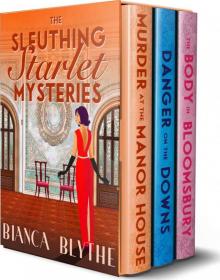 The Sleuthing Starlet Mysteries
The Sleuthing Starlet Mysteries Lords, Snow and Mistletoe
Lords, Snow and Mistletoe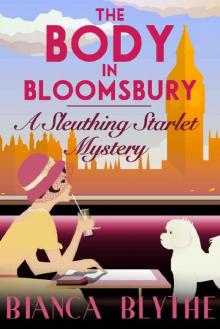 The Body in Bloomsbury
The Body in Bloomsbury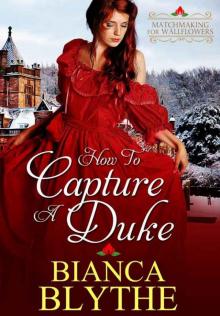 How to Capture a Duke (Matchmaking for Wallflowers Book 1)
How to Capture a Duke (Matchmaking for Wallflowers Book 1)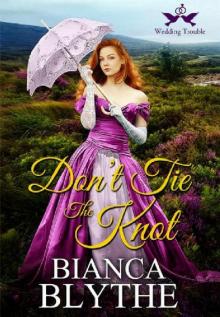 Don't Tie the Knot
Don't Tie the Knot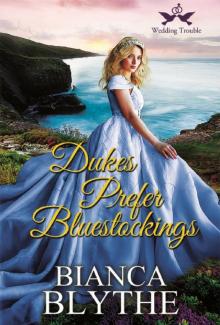 Dukes Prefer Bluestockings
Dukes Prefer Bluestockings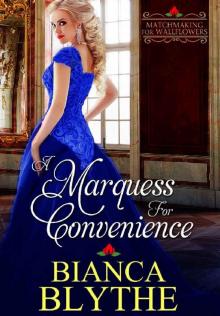 A Marquess for Convenience (Matchmaking for Wallflowers Book 5)
A Marquess for Convenience (Matchmaking for Wallflowers Book 5) Lords, Snow and Mistletoe: A Regency Christmas Collection
Lords, Snow and Mistletoe: A Regency Christmas Collection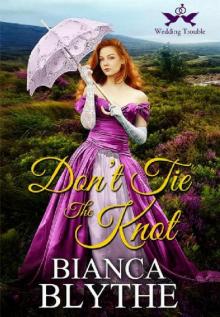 Don't Tie the Knot (Wedding Trouble Book 1)
Don't Tie the Knot (Wedding Trouble Book 1)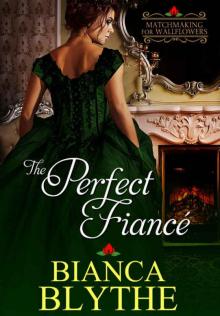 The Perfect Fiancé (Matchmaking for Wallflowers Book 0)
The Perfect Fiancé (Matchmaking for Wallflowers Book 0)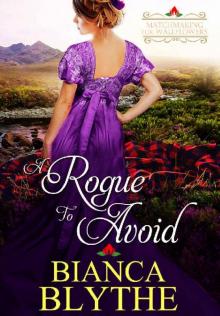 A Rogue to Avoid (Matchmaking for Wallflowers Book 2)
A Rogue to Avoid (Matchmaking for Wallflowers Book 2)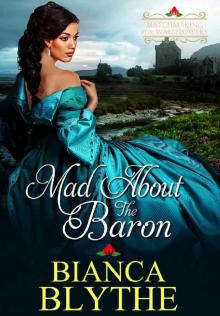 Mad About The Baron (Matchmaking for Wallflowers Book 4)
Mad About The Baron (Matchmaking for Wallflowers Book 4)